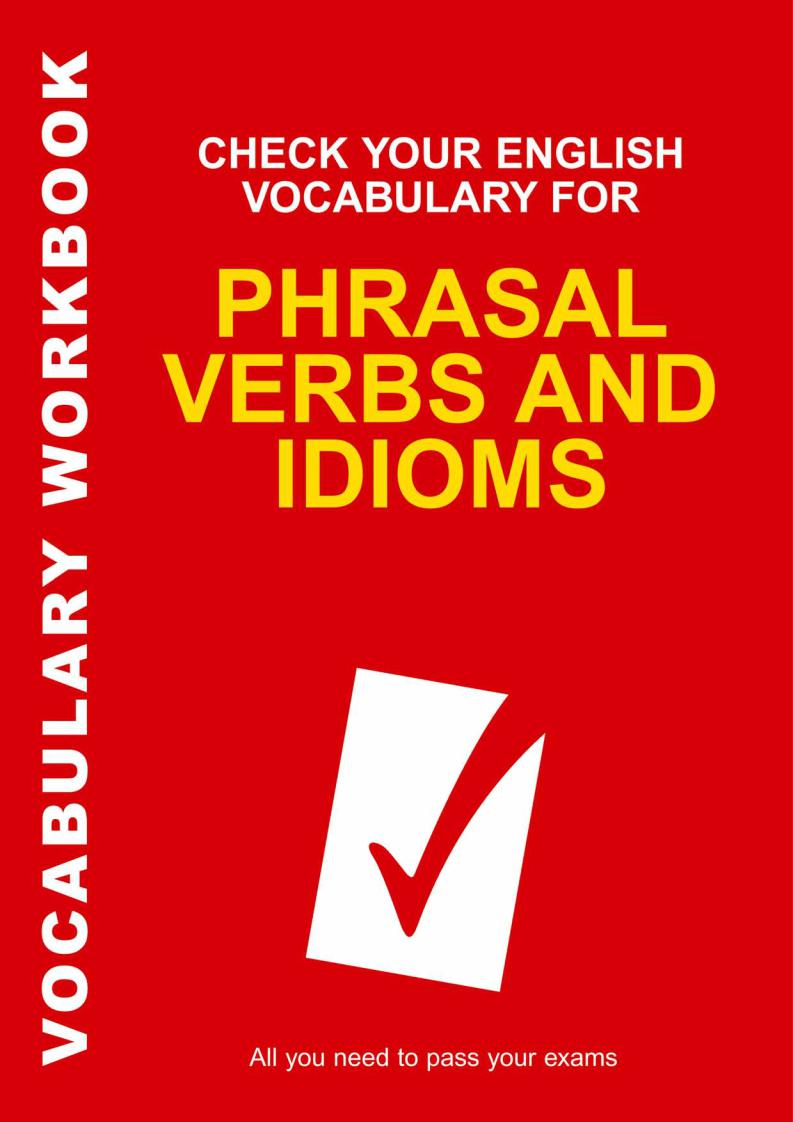
- •Introduction
- •Contents
- •Idioms and other expressions using animals
- •Idioms and other expressions for describing character and personality
- •Idioms and other expressions using clothes
- •Idioms and other expressions using colours
- •Phrasal verbs, idioms and other expressions using 'come'
- •Phrasal verbs, idioms and other expressions using 'cut'
- •Phrasal verbs, idioms and other expressions using 'do'
- •Idiomatic emphasis
- •Idioms and other expressions using food and drink
- •Phrasal verbs, idioms and other expressions using 'give'
- •Phrasal verbs, idioms and other expressions using 'go'
- •Idioms and other expressions to talk about health, feelings and emotions
- •Informal phrasal verbs
- •Phrasal verbs, idioms and other expressions using 'look'
- •Phrasal verbs, idioms and other expressions using 'make'
- •Mixed idioms and other expressions
- •Mixed phrasal verbs
- •Mixed phrasal verbs and idioms
- •Idioms and other expressions used for talking about money
- •Idioms and other expressions that use numbers
- •Idioms and other expressions using parts of the body
- •Phrasal verbs, idioms and other expressions using 'pick'
- •Phrasal verbs, idioms and other expressions using 'put'
- •Idiomatic and colloquial responses
- •Idioms and other expressions that rhyme or alliterate
- •Phrasal verbs, idioms and other expressions using 'run'
- •Phrasal verbs, idioms and other expressions using 'set'
- •Idioms and other expressions using 'time'
- •Idioms and other expressions used for talking about travel and holidays
- •Phrasal verbs, idioms and other expressions using 'turn'
- •Idioms and other expressions that use words connected with the weather
- •Idioms and other expressions used for talking about work
- •Phrasal verbs, idioms and other expressions using 'work'
- •Answer key


CHECK YOUR ENGLISH VOCABULARY FOR
PHRASAL VERBS
AND
IDIOMS
Rawdon Wyatt
A & C Black London
www.acblack.com
First published in Great Britain 2006
A & C Black Publishers Ltd
38 Soho Square, London W1D 3HB
© Rawdon Wyatt 2006
All rights reserved.
No part of this publication may be reproduced in any form without the permission of the publishers.
A CIP entry for this book is available from the British Library ISBN-10: 0 7136 7805 4
ISBN-13: 978 0 7136 7805 5 eISBN-13: 978-1-4081-0158-2
Text typeset by A & C Black
Printed in Great Britain at Caligraving Ltd, Thetford, Norfolk
This book is produced using paper that is made from wood grown in managed, sustainable forests. It is natural, renewable and recyclable. The logging and manufacturing processes conform to the environmental regulations of the country of origin.

Introduction
If you want to practise and develop your knowledge of phrasal verbs and idioms, you will find this book very useful. The various exercises contain many of the most common phrasal verbs and idioms, together with some useful spoken expressions that you might expect to hear or use in an English-speaking environment.
You should not go through this book mechanically from beginning to end. It is better to choose one particular verb or topic, do the exercise(s), make a record of any new words and expressions that you learn, then practise using these in sentences or situations of your own. When you feel you have a good command of these, move to another verb or topic and do the same. You should also review the things you have learned on a regular basis, so that they remain 'fresh' in your mind and become part of your 'active' vocabulary.
The meanings of most of the phrasal verbs and idioms are explained in the book, either in the exercises themselves, or in the answer key at the back. This key also provides you with lots of similar or alternative expressions, together with examples of how they are used. However, we recommend that you keep a good dictionary with you, and refer to it when necessary. In particular, we recommend the A & C Black Easier English Intermediate Dictionary (ISBN 0-7475-6989-4) or the Macmillan English Dictionary (ISBN 0-333- 96482-9), from which many of the definitions and sample sentences in this book have been taken.
No vocabulary book can possibly contain all of the thousands of English phrasal verbs and idioms that you are likely to come across or need, so it is important to acquire new ones from other sources. If you have access to English-language newspapers, popular magazines, television and radio programmes, films and albums of popular music, you will find that these are excellent resources.
We hope that you enjoy doing the exercises in this book. Before you begin, we suggest that you read this important information about phrasal verbs and idioms.
What is a phrasal verb?
A phrasal verb is a verb formed from two (or sometimes three) parts: a verb and an adverb or preposition. These adverbs and prepositions are often called particles when they are used in a phrasal verb.
Most phrasal verbs are formed from a small number of verbs (for example, get, go, come, put and set) and a small number of particles (for example, away, out, off, up and in).
Phrasal verbs sometimes have meanings that you can easily guess (for example, sit down or look for). However, in most cases their meanings are quite different from the meanings of the verb they are formed from. For example, hold up can mean 'to cause a delay' or 'to try to rob someone'. The original meaning of hold (for example, to hold something in your hands) no longer applies.
There are five main types of phrasal verb. These are:
1.Intransitive phrasal verbs (= phrasal verbs which do not need an object). For example: You're driving too fast. You ought to slow down.
2.Transitive phrasal verbs (= phrasal verbs which must have an object) where the object can come in one of two positions:
(1) Between the verb and the particle(s).
For example: I think I'll put my jacket on. or
(2) After the particle.
For example: I think I'll put on my jacket.

However, if the object is a pronoun (he, she, it, etc), it must usually come between the verb and the particle.
For example: I think I'll put it on. (NOT I think I'll put on it.)
3.Transitive phrasal verbs where the object must come between the verb and the particle. For example: Our latest designs set our company apart from our rivals.
4.Transitive phrasal verbs where the object must come after the particle. For example: John takes after his mother.
Why do you put up with the way he treats you?
5.Transitive phrasal verbs with two objects, one after the verb and one after the particle. For example: They put their success down to good planning.
Some transitive phrasal verbs can be used in the passive, but the object cannot come between the verb and the particle.
For example:
Active: The soldiers blew up the bridge / The soldiers blew the bridge up.
Passive: The bridge was blown up by the soldiers.
Active: Switch the lights off before you leave / Switch off the lights before you leave. Passive: The lights must be switched off before you leave.
Active: It's time they did away with these silly rules.
Passive: It's time these silly rules were done away with. (where the subject is either not known or not needed).
A dictionary such as the Bloomsbury Easier English Intermediate Dictionary or the Macmillan English Dictionary will clearly show you the way you should use each phrasal verb.
What is an idiom?
An idiom is an expression where the meaning is different from the meaning of the individual words.
For example, to have your feet on the ground is an idiom meaning 'to be sensible': "Tara is an intelligent girl who has both her feet firmly on the ground."
A lot of idioms are formed using phrasal verbs.
For example: After he left me, it took me a long time to pick up the pieces (= It took me a long time to return to a normal life).
Many idioms are colloquial, which means that they are used in informal conversation rather than in writing or formal language.
For example: "I won't tell anyone your secret. My lips are sealed."
In this book, you will find a lot of colloquial idioms, together with some examples of slang (very informal words and expressions that are often used by particular groups of people, such as teenagers). If an idiom that is being practised is informal or very informal, the book will tell you this.

|
Contents |
|
|
Page: |
Title: |
6 – 7 |
Idioms and other expressions using animals |
8 – 9 |
Idioms and other expressions for describing character and personality |
10Idioms and other expressions using clothes
11– 12 Idioms and other expressions using colours
13 – 14 Phrasal verbs, idioms and other expressions using 'come' 15 – 16 Phrasal verbs, idioms and other expressions using 'cut' 17 – 18 Phrasal verbs, idioms and other expressions using 'do' 19 – 20 Idiomatic emphasis
21 – 22 Idioms and other expressions using food and drink
23 – 24 Phrasal verbs, idioms and other expressions using 'get'
25Phrasal verbs, idioms and other expressions using 'give'
26– 27 Phrasal verbs, idioms and other expressions using 'go'
28Idioms and other expressions to talk about health, feelings and emotions
29– 30 Informal phrasal verbs
31 – 32 Phrasal verbs, idioms and other expressions using 'look' 33 – 34 Phrasal verbs, idioms and other expressions using 'make' 35 – 36 Mixed idioms and other expressions
37 – 38 Mixed phrasal verbs
39Mixed phrasal verbs and idioms
40Idioms and other expressions used for talking about money
41– 42 Idioms and other expressions that use numbers
43Idiomatic pairs
44– 45 Idioms and other expressions using parts of the body
46Phrasal verbs, idioms and other expressions using 'pick'
47Phrasal verbs, idioms and other expressions using 'put'
48– 49 Idiomatic and colloquial responses
50 – 51 Idioms and other expressions that rhyme or alliterate 52 – 53 Phrasal verbs, idioms and other expressions using 'run'
54Phrasal verbs, idioms and other expressions using 'set'
55– 56 Phrasal verbs, idioms and other expressions using 'take'
57Idioms and other expressions using 'time'
58– 59 Idioms and other expressions used for talking about travel and holidays
60– 61 Phrasal verbs, idioms and other expressions using 'turn'
62Idioms and other expressions that use words connected with the weather
63– 64 Idioms and other expressions used for talking about work
65Phrasal verbs, idioms and other expressions using 'work'
66– 80 Answer key

Idioms and other expressions using animals
Complete the idioms and other expressions in bold with an animal, insect, etc, from the box. Many of the animals must be used more than once. The meaning of each idiom / expression is explained in italics at the end of each sentence.
bee bird |
cat |
chicken |
dog |
donkey |
duck |
fish |
fly goat |
goose |
hen |
horse |
monkey |
pig |
rat |
shark |
whale |
|
|
|
|
|
|
|
|
1.I always thought Laurence was rather shallow and superficial, but yesterday I saw him reading a book of Renaissance poetry. He's a bit of a dark _____, isn't he? (someone with a secret, especially a secret ability, skill or achievement that surprises you when you discover it)
2.I'm not going out with you looking like that. You look like something that the _____ dragged in! Brush your hair and put on some clean clothes! (to have a very dirty or untidy appearance)
3.I live on the 14th floor of a tower block, so I have a wonderful _____'s-eye view of the town. (a good view of something from a high position)
4.How did I know that you were going out with Lucy? Aha! A little _____ told me! (an expression used for saying that you are not going to say who told you something)
5.It really gets my _____, the way she keeps interrupting all the time. (to annoy someone)
6.William didn't get the promotion he wanted last year, and he's had a _____ in his bonnet about it ever since. (to be very involved in something that you think is important, in a way that other people
find annoying)
7.You really let the _____ out of the bag when you asked Louise what time her party started. She didn't know anything about it. It was supposed to be a surprise. (to tell someone something that was supposed to be a secret)
8.Where have you been? You're soaking wet! You look like a drowned _____! (looking very wet and cold)
9.Tony! What a surprise! It's wonderful to see you again. I haven't seen you for _____'s years! (an extremely long time)
10.The hotel used to be the best in town, but since the new manager took over it's really gone to the
_____s. (not as good at it was in the past)
11.I don't trust Eric when he says he's working late at the office. To be honest, I smell a _____. (to be suspicious, or to think that someone is trying to trick you)
12.That's the third burger you've eaten. I wish you'd stop making such a _____ of yourself. (to eat a lot of food)
13."Do you think I'll pass my driving test tomorrow, Julie?" "Sorry, Mark, I don't think you have a
_____ in hell's chance." (to have no chance at all of doing something)
14.I only started my new job last week, and I still feel like a _____ out of water. (to be in a situation that you know nothing about or are not used to)
15."How did you know that Mr Roberts is going to resign?" "I got it straight from the _____'s mouth." (information that comes from someone who is directly involved – in this case, from Mr Roberts)
16.Have you met our new manager? He really thinks he's the _____'s knees! (to think you are very clever and important)
6

17.What do you think of our new English teacher? Personally I think she's a bit of a cold _____. (someone who is not very friendly)
18.Antonia is very timid: she wouldn't say boo to a _____. (an expression used to describe someone who is very quiet and shy)
19.Why do I always have to do the _____ work? (boring work that needs a lot of effort but has to be done as part of a job)
20.I'd love to be a _____ on the wall when Debbie tells Mr Roberts what she thinks of him! (to be able to see what people are doing without them noticing you)
21.Two weeks before her wedding, Jane went to a nightclub for her _____ night. (a celebration for a woman who is about to get married, in which only her women friends take part)
22.I'm so hungry, I could eat a _____! (an expression used for saying that you are very hungry)
23.The bank wouldn't lend me the money, so I had to go to a loan _____. (someone who lends money to people and charges them a very high rate of interest)
24.My boss is such a _____bag. I don't think I can go on working for her much longer. (somebody who is unpleasant with other people)
25.I feel really sorry for poor old Steven: he's so _____pecked. (criticised and given orders all the time by a wife or female partner)
26.It was a very simple job, but I made a _____'s ear of it. (do something very badly)
27.I wanted to go to Spain for my holiday, but just before I left for the airport I lost my passport. As you can imagine, that really cooked my _____. (to cause a lot of problems for someone, or spoil their plans)
28.I can't help you at the moment, I'm afraid. I've got bigger _____ to fry. (to have more important things to do or think about)
29.The party was wonderful. We had a _____ of a time. (to have a lot of fun)
30.You can tell John that he's a stupid boring idiot if you like, but I'm afraid it will just be water off a
_____'s back. (an expression used for saying that advice, warnings or insults do not affect someone)
31.I've got so many things to do today. I'm running around like a headless _____! (trying to do a lot of things quickly without being sensible or calm about it)
32.He thinks he's better than us. I wish he would get off his high _____. (stop behaving as if he knows more or is better than anyone else)
33.Corporate fat _____s have once again been accused of putting profits before people. (people who receive too much money for the job they do)
34.I don't like him, I don't respect him, and I don't give a _____'s what he thinks. (to not care about something at all)
35.While we're in town doing our shopping, let's go and see my mother. That way, we can kill two
_____s with one stone. (to achieve two aims with one action)
36.I've never seen Arnie looking so happy. He's like a _____ with two tails. (to be very happy because something good has happened)
Note that most of the expressions in this exercise are informal or very informal.
7
